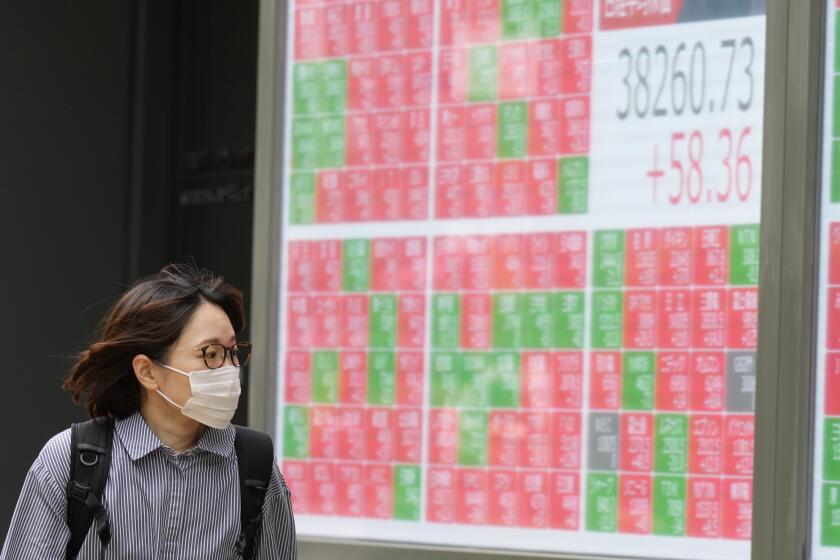Russia’s Woes Fuel New Slide in Asian Stocks
Asia’s battered stock markets suffered renewed heavy selling early today after Russian President Boris N. Yeltsin sacked his government--creating more uncertainty for already jittery world financial markets.
In Tokyo, the benchmark Nikkei-225 stock index--which had risen 1.2% last week--was off 408.69 points, or 2.7%, to 14,889.51 at midday.
“Russian instability and U.S. market volatility” are pressuring the market, said Dhia Amir, senior trader at Nomura Securities Co. in Tokyo. That’s leading “to continuous selling of Japanese blue chips.”
In Malaysia stocks fell to new 10-year lows, with the main share index down 3.6% to 312.29 in early trading. In Thailand the main stock index was down 2.8% to 232.18 early today, nearing a new 11-year low.
Hong Kong stocks resumed their downtrend despite renewed government efforts on Monday to use central-bank funds to support the market. The Hang Seng index was off 1.2% to 7,441 in morning trading.
Some retailers in Hong Kong’s swanky inner-city malls are slashing as much as 90% off prices in a bid to keep their recession-hit customers interested. Others have already lost the battle, laying off staff and closing outlets.
Even Taiwan, where the economy this year has been relatively insulated from the turmoil elsewhere in the region, saw stocks today hit new 1998 lows early today, with the composite index losing 3.2% to 6,979.74 in morning trading.
Meanwhile, in currency trading the Australian dollar fell to its lowest in 12 years against the U.S. dollar on fears that global commodity prices may continue to slide. Australia is a major commodity exporter.
Prices of grain, oil, metals and other commodities have been sinking as Asian demand for raw materials declines with the severe economic contraction there.
The only strength in markets early today was in the Japanese yen, which gained slightly against the dollar, to 144.7 yen, despite the slide in Tokyo stocks.
The yen has recently strengthened from an 8-year low of 147 to the dollar as the Japanese government has threatened to intervene to sell dollars and buy yen.
Haruhiko Kuroda, director general of the Finance Ministry’s international bureau, said Monday that Japan is ready to support the yen if necessary because an excessively weak yen is bad for Japan, Asia and the rest of the world.
Meanwhile, the German mark fell in Asian dealings, to about 1.8 to the dollar, as traders worried about the impact of Yeltsin’s surprise move.
The continuing downward spiral in Asian stocks will set a poor tone for European, Latin American and U.S. markets today, analysts said.
“Instability in international markets suggests economic problems are expanding worldwide,” said Kevin Lin, manager of $144 million for Entrust Investment Trust Corp.
European markets were slammed on Friday on concerns that Russia’s troubles will worsen. That was before Yeltsin’s decision Sunday to fire his Cabinet--which will raise new questions about the government’s plan to restructure its heavy debt load and keep the economy from collapsing.
“It crushes investor sentiment everywhere. Where do you hide?” said Alex Muromcew, international portfolio manager at Nicholas Applegate Capital Management.
Latin American markets were among the worst hit last week, on rumors that Venezuela will become the latest country to devalue its currency because of economic weakness and budget woes.
On Wall Street on Friday the Dow industrials lost nearly 78 points to 8,533.65, after recovering from a 280-point morning plunge.
U.S. bond yields hit record lows on Friday, amid a continuing “flight to quality” by global investors. But analysts noted that the U.S. stock market overall did not respond favorably to lower rates last week. On the New York Stock Exchange 1,938 issues fell last week while 1,455 rose.






